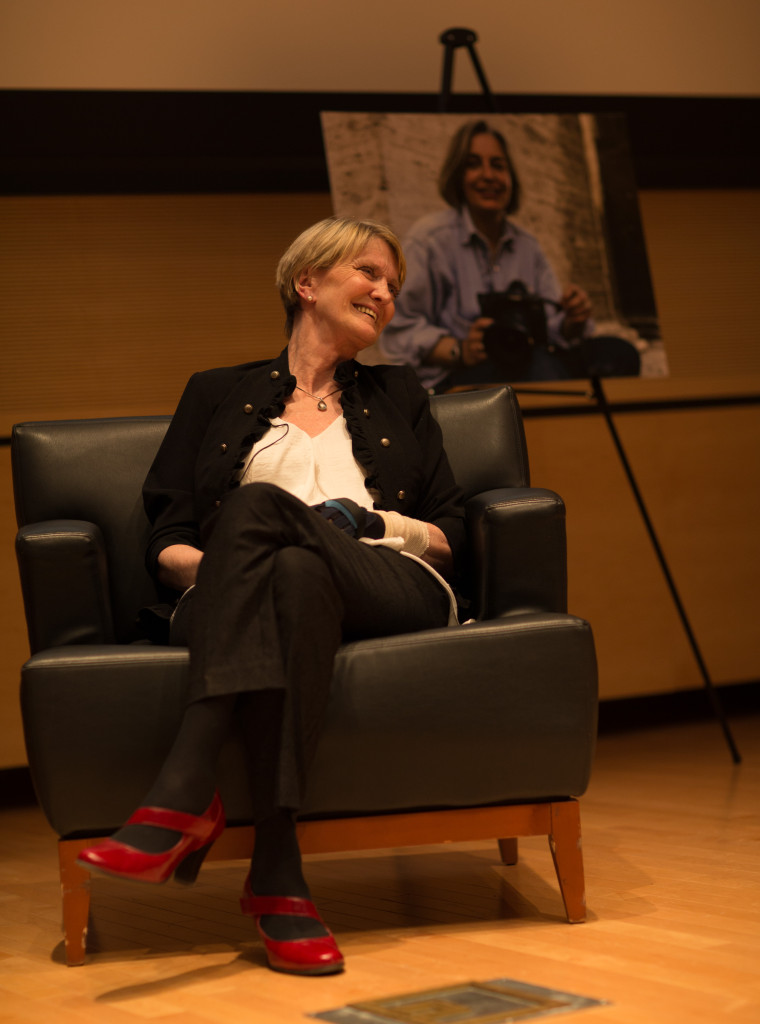Kathy Gannon, senior correspondent for the Associated Press, wins 2015 Tully Free Speech Award

Sitting in the backseat of a truck, Kathy Gannon leaned against Anja Niedringhaus, her friend and coworker who, like Gannon, was on assignment for the Associated Press. It was April 4, 2014, and the two bumped along a long road in Afghanistan as they were driven frantically to a hospital miles away.
An Afghan police commander had opened fire on them moments before, and Gannon thought she had reached the end of her life.
“I don’t remember the gunman lifting up his AK-47—I only remember the bullets hitting my body,” Gannon said. “I was just trying to concentrate on going peacefully.”
Gannon was the ninth recipient of the Tully Free Speech Award earlier this week for her heroic, relentless courage while working as a senior correspondent for the AP in Pakistan and Afghanistan. The 2014 attack left Gannon with limited use of her hands and mortally wounded Niedringhaus, shocking the world with the sheer danger reporters face in the effort to tell the stories of those two countries.
The Tully Free Speech Award is presented annually by the Newhouse School’s Tully Center for Free Speech.
Kathleen Carroll, senior vice president and executive editor of the AP, attended the award ceremony honoring Gannon and gave the opening remarks. Standing tall in front of a packed crowd in the Joyce Hergenhan Auditorium, she highlighted Gannon’s humorous attitude and ferocious passion—traits evident in her work.
“You know that she has received a number of awards, and the Tully Award just adds to the distinguished roster,” Carroll said. “What you don’t know about Kathy is that she is the embodiment of everything that Tully seeks to recognize—she is tenacious, she is tough.”
Roy Gutterman, the Tully Center’s director, led a conversation spanning various parts of Gannon’s life—her work prior to joining the AP, her recovery from a shooting that would lead to 16 subsequent surgeries and her experiences with the Taliban as a woman reporting on Afghanistan and Pakistan.
When asked about the experience of covering the Taliban so closely, especially as a woman, Gannon responded with her typical spunky humor.
“Well, we had a lot of fights—we argued a lot,” she said, eliciting muffled laughter from the audience. “As a reporter, your job is to try the very best you can to get the story, and I did just that.”
At times, Gannon said she was the only reporter with exclusive contact with the Islamic fundamentalist group. In the early 2000s, the Taliban interacted in a much different way with the media than they do now, she said.
“There was some anger at some of the things I had written, but I think their ability to follow was not as great then as it is now,” Gannon said. “They weren’t about trying to get messages out—I don’t think they saw me as being able to change the opinions in the West towards them.”
Gannon also talked about taking precautions—she and Niedringhaus, or whomever else she traveled with at the time, would make sure they knew someone in the area who could help them find a safe place to stay and apprise them of any nearby conflict. But danger inevitably worked its way into their lives though, she admitted.
At one point, she and a few others were walking when someone stepped on a landmine. They were in the middle of a minefield, and had to carefully back track to escape.
“Certainly there had been moments of danger and threats,” Gannon said. “You’re working your way through this together—you find your strength and your courage in each other.”
Gutterman asked her about meeting Niedringhaus, and about what it was like to lose her. Gannon admitted with a laugh that they bonded over several bottles of wine and became instantaneous friends.
Niedringhaus’ dedication to her work matched her own, she said, and the two had the same desire to tell stories with considerable depth.
“Anja had the same passion for wanting to tell a story,” Gannon said. “She didn’t want to be parachuted in—she really wanted to tell a story through.”
The two worked on multiple projects, including a particularly intense story on drivers who make a treacherous trip through the country running oil shipments. Gannon reflected on Niedringhaus’ ability to connect with people and said that even though she is no longer alive, she would have returned to Afghanistan without a doubt. Gannon herself returned to work in Islamabad at the beginning of this year.
“I am so grateful that I am able to be here. I am so grateful for the time I had with Anja,” she said. “I don’t want to change who I am and how I feel about things, and I also know Anja would never for a moment entertain the thought of not returning.”
Georgie Silvarole is a junior newspaper and online journalism major at the Newhouse School.